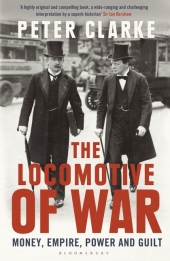 Neuerscheinungen 2018Stand: 2020-02-01 |
Schnellsuche
ISBN/Stichwort/Autor
|
Herderstraße 10
10625 Berlin
Tel.: 030 315 714 16
Fax 030 315 714 14
info@buchspektrum.de |

Peter Clarke
The Locomotive of War
Money, Empire, Power and Guilt
2018. 432 S. 7.8 in
Verlag/Jahr: BLOOMSBURY TRADE; BLOOMSBURY PAPERBACKS 2018
ISBN: 1-408-85168-7 (1408851687)
Neue ISBN: 978-1-408-85168-5 (9781408851685)
Preis und Lieferzeit: Bitte klicken
A fresh and fascinating reappraisal of the first half of the twentieth century from one of our foremost historians
A Times Literary Supplement Book of the Year for 2017
´War, comrades,´ declared Trotsky, ´is a great locomotive of history.´ He was thought to be acknowledging the opportunity the First World War had offered the Bolsheviks to seize power in Russia in 1917. Twentieth-century warfare, based on new technologies and mass armies, certainly saw the locomotive power of war geared up to an unprecedented level.
Peter Clarke explores the crucial ways in which war can be seen as a prime mover of history in the twentieth century through the eyes of five major figures. In Britain two wartime prime ministers - first David Lloyd George, later Winston Churchill - found their careers made and unmade by the unprecedented challenges they faced. In the United States, two presidents elected in peacetime - Woodrow Wilson and Franklin Roosevelt - likewise found that war drastically changed their agenda. And it was through the experience of war that the economic ideas of John Maynard Keynes were shaped and came to exert wide influence.
When the United States entered the First World War in 1917, President Wilson famously declared: ´The world must be made safe for democracy.´ This liberal prospectus was to be tested in the subsequent peace treaty, one that was to be bitterly remembered by Germans for its ´war guilt clause´. But both in the making of the war and the making of the peace the issue of guilt did not suddenly materialise out of thin air. As Clarke´s narrative shows, it was an integral component of the Anglo-American liberal tradition.
The Locomotive of War is a forensic and punctilious examination of both the interplay between key figures in the context of the unprecedented all-out wars of 1914-18 and 1939-45 and the broader dynamics of history in this extraordinary period. Deeply revealing and insightful, it is history of the highest calibre.
A highly original and compelling book, a wide-ranging and challenging interpretation by a superb historian. Clarke brilliantly shows how the moral imperatives of Anglo-American liberalism shaped the impact of total war in the West after 1945. In stark contrast to Trotsky´s prediction of world revolution, major social advances under reformed capitalism were the result - that is, until regression began with the new inequalities that set in during the 1970s Ian Kershaw, author of ´To Hell and Back: Europe, 1914-1949´
Peter Clarke was formerly a professor of modern history and Master of Trinity Hall at Cambridge. His many books include Keynes: The Twentieth Century´s Most Influential Economist, the acclaimed final volume of the Penguin History of Britain, Hope and Glory, Britain 1900-2000 and Mr Churchill´s Profession, a study of Churchill as writer. He is now resident in Cambridge.
Peter Clarke was formerly a professor of modern history and Master of Trinity Hall at Cambridge. His many books include Keynes: The Twentieth Century´s Most Influential Economist, The Last Thousand Days of the British Empire, The Keynesian Revolution in the Making, 1924-1936 and the acclaimed final volume of the Penguin History of Britain, Hope and Glory, Britain 1900-2000. He lives with his wife, the Canadian writer Maria Tippett, in Cambridge, England, and Pender Island, British Columbia.


